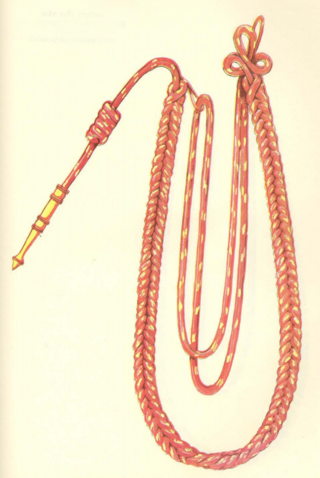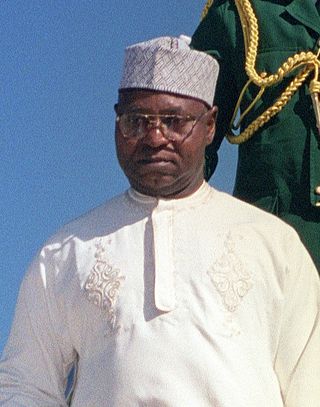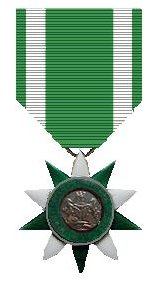Related Research Articles

The Order of Merit of the Federal Republic of Germany is the only federal decoration of Germany. It is awarded for special achievements in political, economic, cultural, intellectual or honorary fields. It was created by the first President of the Federal Republic of Germany, Theodor Heuss, on 7 September 1951. Colloquially, the decorations of the different classes of the Order are also known as the Federal Cross of Merit.

The National Order of Vietnam was a combined military-civilian decoration of South Vietnam and was considered the highest honor that could be bestowed upon an individual by the Republic of Vietnam government.

The Order of Leopold is one of the three current Belgian national honorary orders of knighthood. It is the oldest and highest order of Belgium and is named in honour of its founder, King Leopold I. It consists of a military, a maritime and a civil division. The maritime division is only awarded to personnel of the merchant navy, and the military division to military personnel. The decoration was established on 11 July 1832 and is awarded by Royal order.
The orders, decorations, and medals of Canada comprise a complex system by which Canadians are honoured by the country's sovereign for actions or deeds that benefit their community or the country at large. Modelled on its British predecessor, the structure originated in the 1930s, but began to come to full fruition at the time of Canada's centennial in 1967, with the establishment of the Order of Canada, and has since grown in both size and scope to include dynastic and national orders, state, civil, and military decorations; and various campaign medals. The monarch in right of each Canadian province also issues distinct orders and medals to honour residents for work performed in just their province. The provincial honours, as with some of their national counterparts, grant the use of post-nominal letters and or supporters and other devices to be used on personal coats of arms.
Authorized foreign decorations of the United States military are those military decorations which have been approved for wear by members of the United States armed forces but whose awarding authority is the government of a country other than the United States.
Okhai Michael Akhigbe was a vice admiral of the Nigerian Navy who served as de facto vice president of Nigeria under military head of state General Abdusalami Abubakar from June 1998 to May 1999, when the military government was terminated and replaced with the Fourth Nigerian Republic. He previously served as Chief of Naval Staff, the highest-ranking officer of the Nigerian Navy from 1994 to 1998; military governor of Lagos State from 1986 to 1988; and military governor of Ondo State from 1985 to 1986.

Abdulsalami Abubakar is a Nigerian statesman and retired Nigerian army general who served as the military head of state of Nigeria from 1998 to 1999. He was also Chief of Defence Staff from 1997 to 1998. He succeeded General Sani Abacha upon his death.
Bashir Salihi Magashi is a retired Nigerian Army major general who served as the defence minister of Nigeria from 2019 to 2023. He served as governor of Sokoto State from August 1990 to January 1992 during the military regime of General Ibrahim Babangida, and as commandant of the Nigerian Defence Academy from 1998 to 1999.

The Decoration of Honour for Services to the Republic of Austria is a state decoration of the Republic of Austria. It is divided into 15 classes and is the highest award in the Austrian national honours system.

John Nmadu Yisa-Doko, GCON, CFR was the first Nigerian Air Force's Chief of the Air Staff from 1975 to 1980 who joined as a NAF cadet.

Nigeria became an independent country on 1 October 1960 and in 1963 became the Federal Republic of Nigeria. The republic instituted two orders of merit: the Order of the Niger and the Order of the Federal Republic.
Orders, decorations, and medals of Kenya are awarded by the President of Kenya "in recognition of outstanding or distinguished services rendered to the nation in various capacities and responsibilities". Awards are made by the president upon the advice of a National Honours and Awards Committee in the president's office. Individuals are nominated for awards by district committees, government ministries, religious organisations, non-governmental organisations, individuals and others. The Chief of the Order of the Golden Heart is the highest honour awarded by the Kenyan government.
The Chilean honours system provides a means for the Government of Chile to reward gallantry, achievement, or service, by both Chileans and non-citizens. The honours system consists of three types of award: orders, decorations and medals. Membership of an Order is conferred to recognise merit in terms of achievement and service. Decorations are conferred to recognise specific deeds of gallantry, bravery, distinguished or meritorious service. Medals are conferred to recognise long and/or valuable service and/or good conduct. Awards to non-citizens are usually only made where the gallantry, achievement or service has advanced Chilean interests in some way. The honours conferred by the Chilean Republic can be divided into two groups: civil and military. Military honours are conferred by the different branches of the Armed Forces of Chile. Civil honours are conferred by the President of Chile or, in some instances, by the government minister relevant to the particular honour.
The orders, decorations, and medals of Malaysia comprise a complex system by which Malaysians and qualified foreigners are honoured by the country's sovereign for actions or deeds that benefit their community or the country at large. Modelled on its British predecessor, the orders, decorations, and medals of Malaysia were created after formation of Malaysia. The honour system came to exist earlier during Federation of Malaya. During the British colonial times, honours were given under the British honour system. Johor was the first state to institute its own honours on 31 July 1880. Then, the other Malay states did the same.

The Order of the Federal Republic (OFR) is one of two orders of merit, established by the Federal Republic of Nigeria in 1963. It is senior to the Order of the Niger.
The Star of South Africa, Grand Cross, post-nominal letters SSA, is the senior decoration of five non-military classes of the Order of the Star of South Africa, a South African Military Order that was instituted by the Republic on 1 July 1975. The Order of the Star of South Africa was discontinued in 2002.

The Star of South Africa, Commander, post-nominal letters CSSA, is the third highest decoration of five non-military classes of the Order of the Star of South Africa, a South African military order that was instituted by the Republic of South Africa on 1 July 1975. The Order of the Star of South Africa was discontinued in 2002.

The Star of South Africa, Officer is the fourth-ranked decoration of five non-military classes of the Order of the Star of South Africa, a South African military order that was instituted by the Republic on 1 July 1975. The Order of the Star of South Africa was discontinued in 2002.
The Star of South Africa, Grand Officer, post-nominal letters SSAS, is the second decoration of five non-military classes of the Order of the Star of South Africa, a military order that was instituted by the Republic of South Africa on 1 July 1975. The Order of the Star of South Africa was discontinued in 2002.
Awards and decorations of Latvia are governed by the Republic of Latvia Law on State Honours of 2004, last amended in 2010.
References
- ↑ "Nigerian Culture Kids | For Kids from Nigeria". nckids. Retrieved 2021-04-18.